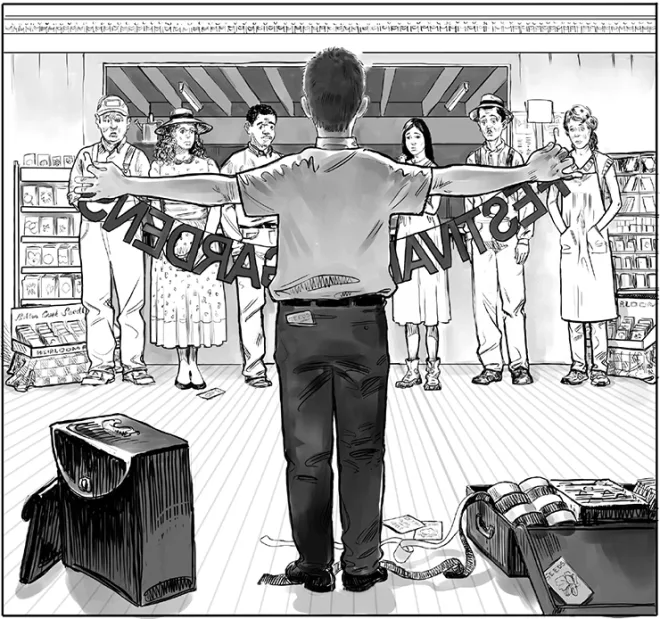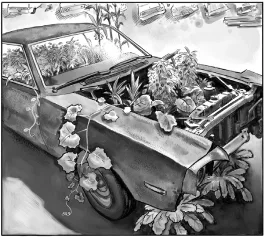Last issue, in GP #100, I was fortunate enough to uncover and share a hysterically funny Mark Twain agricultural story. That, I admit, was a coup: No one I know had ever heard of the piece before!
This time I have a wonderful tale by the man who could quite rightly be called the Mark Twain of today. Lady and Gentleman Gardeners, for your 25th Anniversary Year reading pleasure, let me present…Seeds.

It has been a quiet week in Lake Woebegon. It was cloudy most of the week, and a cold wind blew in off the lake and picked up some dust off the street and blew it right in your face. You walk around in dim light carrying ten pounds of wool and look down a cold gray street lined with miserable yards and taste dust in your mouth and then get some dirt in your eyes, it brings your life to a halt. You’ve got to find your mother, your teacher, Sister Arvonne, to wipe your eyes, but you can barely see, standing helpless, weeping, cold; it’s no wonder at that moment you think, “Albuquerque. Why didn’t I think of Albuquerque? Why didn’t my parents think about Albuquerque before I was born? I’d be a native Albuquerquian, or Albuquerquer.” It never gets cold and you don’t grow old because you just stay young lying in the sun, oh the sky is never murky in Albuquerque.
Do Albuquerquians ever long for Minnesota? I imagine they do. I imagine they would envy us even more than they do if they knew more about us. I imagine that atheists like it fine in Albuquerque, but the ones who know God and talk to God have asked God, “God, what is your country?” And God told them, “Well, I don’t like to single out one place over another, because of course there are good people everywhere, but if I had to pick one place, based on what I know, which is everything, I guess I’d have to say Minnesota.” Those Albuquerquians (and God knows there must be a few of them) must want to live here in the worst way. And March is a month when you can do that.
It was a quiet week. Josh, a salesman for Inspirational Systems, visited Pastor Ingqvist’s tiny office in the Lutheran annex on Wednesday, selling a worship program for Advent called “Actualizing the Child in Ourselves.” Bud took the snowplow off the truck Wednesday evening, being tired of driving around with it banging up and down. He said, “It’s sure to snow now, but it’ll just have to melt, I am through thinking about it.”
My attitude exactly. I put away my parka in April and put on a jacket. If it turns cold, that’s not my problem, I refuse to accept winter anymore. If we get a blizzard, let someone else worry about it. I won’t. There comes a point where you have to stand up to reality and deny it. Rain, rain, go away, come again another day. O-U-T spells Out. When I got fed up with weeding the garden, I’d look at the weeds and say, “That’s not weeds. I say that’s spinach, and I say let it stay where it is.”
When Ruthie had her baby out of wedlock (actually not “out” of wedlock, just not quite far enough into wedlock, about six and a half months), as the wedding approached people said, “Oh, I don’t think she’s heavier. She always was big-boned, you know.” As if we had bones in our bellies. When the baby came, people fussed over it and said, “My, I can’t believe how big it is.” At 8 pounds, 4 ounces, it was the most gigantic baby ever born two and a half months premature.
Down the block, at the Feed ‘N Seed, Harold has set up the old wooden bins to put seed packets in that’ve arrived from the Milton Seed Co. in Northrup, South Dakota. Big corn and bean packets, plain yellow envelopes, and this year he’s ordered more of the packets with color pictures on them and is even hanging up green and yellow crêpe paper that the Milton salesman gave him and signs saying “Festival of Gardens” and “Top Quality, Best Value.” The salesman, Ritche, says this could almost double seed sales, he’s seen it happen. He says to Harold, “You got to build excitement, make a visual appeal to the passers-by and your walk-ins, you got to make them think seeds the minute they come through the door. Did you know that one-third of all seed sales is pure impulse? People walk in—BAM—they gotta have some seeds right now!” Mass displays, more color, and these new seed packets with the Scratch ‘N Sniff pictures: They were a big hit in the test market last year.
But seeds are all the Feed ‘N Seed sells—that and feeds—so if you weren’t already thinking seeds you probably wouldn’t come in unless it was to hang around with Harold and talk about the basketball tournament. Anoka won, and Harold won $24 when they did. It’s spring itself that builds excitement and makes a visual appeal for the passer-by, and if prospects of spring don’t excite you, probably crêpe paper won’t have a big effect. But Ritche believes this is going to be it, the big year, the great garden boom, when Milton triples tomato-seed sales—big growth in the carrot-and-beet sector, cucumbers up this year, beans, pole beans way up, gross national kohlrabi, eggplant, everything up this year. Ritche is 25. Already he is one of Milton’s best. Richard is his name but he uses Ritche because it gets noticed. People see it, they remember you, name recognition is important in sales.

He lives in Marshall: He and Cindy bought a townhouse on the edge of town; they are expecting a baby in July, and he believes that in seed sales and in his own life, things are starting to turn around. Driving on to the next call, 10, 20, 30 miles away, he gets excited when he sees the town, its big grain elevator on the horizon. He says, “Come on. Let’s go. Let’s go, big team. Let’s go, sales!” He’s on the road for Milton six days a week, crisscrossing the district in his ‘78 rambler wagon. It’s full of crêpe paper, Styrofoam cups, and burger cartons. The carpet is ripped and the floorboards are mulched with dirt from a hundred little towns. Old seed samples take root there. The rambler has almost a quarter-million miles on it, and soon it’ll go to a junkyard and sit. Corn and beans will grow up in it and muskmelon vines come out of the seats. All the seeds he spilled in there will blossom into a little forest of flowers on wheels, vines trailing out of it. The plants will reproduce for years. All the old seed salesman’s cars become pots for plants. And the most luxurious ones grow on the seat where he sat. It’s all waiting for spring to happen. ❖
From Leaving Home: A Collection of Lake Woebegon Stories by Garrison Keillor. Copyright © 1987 by Garrison Keillor. Reprinted with permission of Viking Penguin, Inc., 40 W. 23rd St., New York, NY, 10010.


